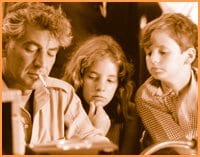From the comfort of her apartment in Chelsea (“the gayest neighborhood in New York”), Leonard Bernstein’s daughter, Jamie, recounts the joys of growing up amongst “noisy, excitable people” who would “sit around the piano and drink and smoke and laugh.”
Then she pauses.
“Everything seemed pretty idyllic until I was 11. It was 1963 and President Kennedy was assassinated. I always think of that as the turning point, when I became aware of the difficulties of the world and my parents’ own sadnesses and darknesses. That was when everything changed. A fall from grace, as it were.”
The course of Leonard Bernstein’s life-at once charmed by fame and haunted by a conflicted sexuality-mirrored the national consciousness of his era.
For the young Jamie, who once watched an episode of The Flintstones where Betty and Wilma were all aflutter at going to see the famous composer and conductor “Leonard Bernstone,” that fall from grace was both immediate and made strange.
Her father slept most of the day and worked all night when he stayed home to compose, Jamie recalls. “We had to tiptoe around all day, until he materialized.”
Later in life, Bernstein relied heavily on medication to maintain his unusual routine.
“All of this really bent him out of shape,” his daughter says.
The children were not the only tiptoers in the house, either.
For Felicia, Bernstein’s wife, “my father’s bisexuality was tremendously difficult. It was very hard for my mother and it got so hard that in 1976 they separated.”
Bernstein had fallen madly in love with a 20-something man named Thomas Cothran. While Bernstein had experienced homosexual affairs before, Cothran-“a wonderful, twinkly, bright, endearing person,” according to Bernstein’s recording producer John McClure-appeared to be a case of real love.
“My father was on fire,” Jamie recalls.
“My mother was so insulted. She said, ‘Just don’t bother to come back.'”
But Bernstein’s separation from his wife lasted only a year. “He couldn’t really sustain that lifestyle. He felt lonely and out of sorts with himself,” his daughter says.
Bernstein depended heavily on his wife, Felicia, for a steady home. Within that steadiness, however, there was conflict. “She was ashamed” of Bernstein’s gay life “in spite of herself,” Jamie says.
And so, being a man of his time, was Bernstein.
Musical genius did not allow exemption from the restrictive mores of the day. “It was more complicated,” says his daughter. “You ran into a lot more static. He came from a very straight, bourgeois background. And he himself was uncomfortable with the idea of being openly gay. So I think he just skirted around it the way most everyone did.”
But outside the steadiness, the sanctity of married life, just how gay was Bernstein?
In Gore Vidal’s memoir Palimpsest, the novelist describes a particularly balmy summer when two would-be actors visited Bernstein and Vidal at the Beverly Hills Hotel-an arranged hook-up.
However, peeking into Bernstein’s room mid-dally, Vidal was shocked to discover that “Lenny was seated on a bed, where lay the youth, mesmerized, as Lenny lectured him on his career, character, future Lenny was a born pedant with a powerful need to explain-everything.”
The story rings true. Bernstein, by all accounts, was an educator first and foremost. However disarrayed his psyche may have been, his longing to communicate his passions to others-to teach, through music-was never in question.
In all that effort-which includes two operas, several symphonies, ballets, Broadway musicals, and dozens of narrated Young People’s Concerts-Bernstein’s only explicitly gay work (aside from one song in his cycle “Song Fest” with a text by Walt Whitman) would have to be his 1983 opera, A Quiet Place.
Written with Steven Wadsworth, a friend of Jamie’s from college, the opera shocked many with its frank discussion of sexuality.
“Steven is gay,” notes Jamie. “So when they started writing the story, that just came out too.”
The reviews for A Quiet Place mingled in the papers with reports of a strange new “gay disease”.
Bernstein would lose many friends to AIDS in his final years (he died in 1990). “It was completely devastating,” says his daughter. “He lent his services in whatever way he could.”
Ultimately, Bernstein’s services were farther reaching than any benefit concert.
His music, created in the midst of a double-life (or “four lives” as composer Ned Rorem insists), coupled with his great desire to inspire and educate others, lives on in his daughter’s present work.
“I have such great memories of my dad conveying to me what was exciting about music,” she says, “so I’ve internalized that feeling of sharing music with someone else.”
A singer, songwriter, and educator in her own right, Jamie now serves as the public radio voice of the New York Philharmonic and, in the tradition of her father, hosts its Young People’s Concerts.
Jamie will be in Vancouver later this month to narrate our Symphony Orchestra’s performance of The Bernstein Beat, a concert that aims to teach children and adults the joys of her father’s many-sided, musical legacy.
THE BERNSTEIN BEAT.
Apr 24.
The Orpheum.
Smithe at Seymour Sts.


 Why you can trust Xtra
Why you can trust Xtra


